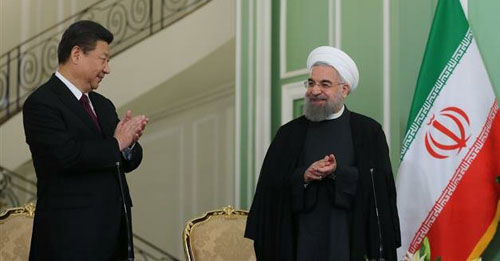FPI / August 18, 2019
Excerpted from Geostrategy-Direct.com
By Yossef Bodansky, Senior Editor, GIS/Defense & Foreign Affairs
All attention is focused on the twists-and-turns of the very noisy U.S.-Iran dispute in the Persian Gulf, but all the while the People’s Republic of China (PRC) is rapidly and quietly consolidating a dominant presence in the area with the active support of Russia.
China’s success can be attributed to the confluence of two major trends:
(1) The quality and relevance of what Beijing can offer to both Iran and the Saudi-Gulf States camp.

(2) The decision of key Arab leaders — most notably Saudi Crown Prince Mohammed bin Salman (aka MBS) and his close ally, the Crown Prince of Abu Dhabi, Sheikh Mohammed bin Zayed Al Nahyan (aka MBZ) — to downgrade their traditional close ties with the U.S., and reach out to Beijing to provide a substitute strategic umbrella.
The profound change in the attitude of the Saudi and Emirati ruling families, who for decades have considered themselves pliant protégés of the U.S., took long to evolve. However, once formulated and adopted, the new policies have been implemented swiftly.
The main driving issue is the realization by both MBS and MBZ that, irrespective of the reassuring rhetoric of U.S. President Donald Trump and Jared Kushner, their bitter nemesis — Qatar — is far more important to the U.S. than the rest of the conservative Arab monarchies and sheikhdoms of the GCC. In early July 2019 in the aftermath of the visit of the Emir of Qatar, Sheikh Tamim bin Hamad Al Thani, to Washington, D.C. Sheikh Tamim received an extravagant reception from both Trump in person and official Washington.
There are good reasons for the U.S. preference of Qatar.
The Al-Udeid Air Base in Qatar is by far the most important U.S. base in the entire greater Middle East. Qatar is mediating between the U.S. and several nemeses, including Afghanistan, Iran, and Turkey.
On top of this, Qatar is purchasing billions of dollars’ worth of U.S.-made weapons; and paying cash on-time (unlike the habitually late Saudis who now cannot afford to pay what they’ve already promised).
Moreover, the Middle East is awash with rumors that Qatari businessmen saved the financial empire of the Kushner family by investing at least half-a-billion dollars in the 666 5th Avenue project in New York. The rumors are very specific in that the investment was made for political reasons on instruction of the Emir. In the conspiracies-driven Arab Middle East, such rumors are believed and serve as a viable motive for the policies of the Trump White House.
Concurrently, with the face-off with the U.S. not going away, Iranian supreme leader Ayatollah Ali Khamenei convened anew the key Iranian leaders in order to reiterate the tenets of Teheran’s strategy and to reinforce their resolve. Khamenei stressed his and Iran’s commitment to becoming the leading regional power, and repeated that there was no possibility for a negotiated compromise with the U.S. In the meeting, Khamenei stated “three directives for Iran” which were to be followed and realized under any condition. As reported by authoritative commentator Elijah Magnier, Khamenei’s directives are:
“1. Adherence to Iran’s right to nuclear enrichment and everything related to this science at all costs. Nuclear enrichment is a sword Iran can hold in the face of the West, which wants to take it from Teheran. It is Iran’s card to obstruct any U.S. intention of ‘obliterating’ Iran.
More . . . . Current Edition . . . . Subscription Information
Intelligence Brief __________ Replace The Media
